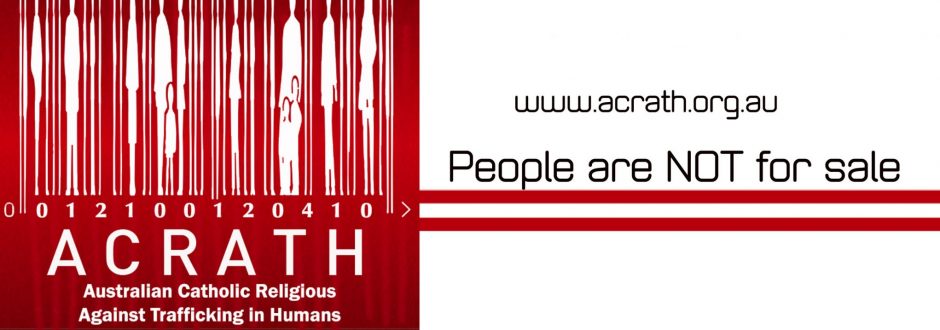Young people are getting behind the move to stop slavery and human trafficking in Australia and around the world, thanks to an awareness-raising program in schools by Australian Catholic Religious Against Trafficking in Humans (ACRATH).
NSW Coordinator for ACRATH, Good Samaritan Sister Sarah Puls, said one of ACRATH’s core objectives is to raise awareness of the issues around slavery and trafficking right across the community.
“The issue in Australia is still not well understood, although we are making progress, especially in the area of political advocacy,” she said.
“Change doesn’t come about when people aren’t informed, so ACRATH is committed to informing people about the issues.”
Sarah said ACRATH’s work in schools is largely on an invitation basis, where teachers invite an ACRATH member to come and explain the work they do and the issues involved.
“Young people are so open to the experience of other people,” she said. “I think as we get older, we become less able to engage with other people’s stories. But young people have a strong sense of justice and a desire for justice.”
The ACRATH Schools Program typically either involves giving a talk to senior students and inviting them to engage with the issue on a broad basis or addressing a particular class, such as a legal studies class, where the subject is being studied in more depth as part of a study area in the curriculum.
ACRATH has also developed an educational resource to empower schools to canvass the issues of slavery and human trafficking in a way that suits their school, their subjects and the curriculum.
“When we go to schools to speak broadly about these issues, we would, in the first instance explain what human trafficking is, the fact that it happens in Australia and the different kinds of trafficking, such as trafficking for sexual exploitation or labour market exploitation,” Sarah said.
“And importantly, we look at how we as a community, and they as individuals, can respond. We try to leave the students and the schools with a sense that they can do something about this.
“We’ve been really heartened by the response of some schools and students who have acted in different ways to raise awareness, even talking to shop employees about supply-chain issues. They realise that purchasing power is power too.”
For those students undertaking legal studies courses, ACRATH members can hone in on the areas of the curriculum around the study of human rights and human trafficking.
“Our presentations are really effective for these students because what they are learning is real. International law and the Australian criminal code have a real impact on people’s lives, so it helps the students to really flesh out something that can be, otherwise, really distant.
“And we leave them with the question of how can we as a community respond in the law to these situations?”
Sarah said the students are interested in how ACRATH advocates for changes in the law that affect slavery and human trafficking and the success that they and others have had.
“We’ve been working hard on issues around trying to ensure the supply chain for retail and business is free of slavery and exploitation. There is now a government roundtable looking at those issues and ACRATH has a voice on that roundtable,” she said.
ACRATH also welcomed last week’s announcement by the Federal Government that it would harness the power of big business to help combat slavery through the establishment of a Modern Slavery Reporting Requirement, enacted through a new Australian Modern Slavery Act.
ACRATH’s work in schools had a big impact on Charlotte Pratt, a Year 12 student at Marist Sisters’ College, Woolwich, in Sydney.
Charlotte has been studying the issue of human slavery and trafficking in her legal studies class and said a visit to the class by ACRATH President Sister Noelene Simmons SM opened her eyes to the reality of the problem in Australia.
“Nearly 24 million people have been trapped in slavery and human trafficking around the world over the last 20 years,” said Charlotte.
“That’s a ridiculous amount. It’s an issue that appears on the TV or in the media quite often, but it’s not something that teenagers or young people interact with enough.
“I think all the technology we use and live with tends to generalise things more and puts us in our own little bubble, so I think it’s great to raise awareness, especially among young people.”
Charlotte said she was impressed by the steps ACRATH had taken to help the situation of people who had been trafficked into Australia.
“The thing that sticks in my mind was the issue of visas, that ACRATH had been campaigning to get the government to change the visa laws, because when they were released from their trafficking situation they were put on a visa that impacted their ability to get a job. And that situation was reformed, which was great.
“It wasn’t something that I would’ve thought would play a big role in the lives of people who have been trafficked in Australia, but it was actually crucial to them rebuilding their lives.”
She said the work of ACRATH was encouraging to her and her peers.
“When people see an issue where everything’s at a standstill, it feels as though there’s not much they can do to help.
“But seeing ACRATH working with other NGOs to bring about reform gives people hope. It makes you think this is an issue you can get involved in and make a difference.”
